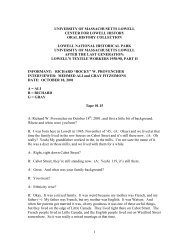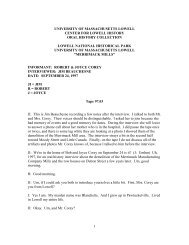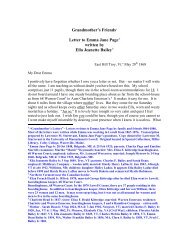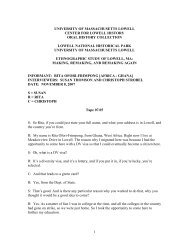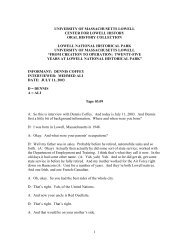LOOM AND SPINDLE OR Life Among the Early Mill Girls WITH A ...
LOOM AND SPINDLE OR Life Among the Early Mill Girls WITH A ...
LOOM AND SPINDLE OR Life Among the Early Mill Girls WITH A ...
Create successful ePaper yourself
Turn your PDF publications into a flip-book with our unique Google optimized e-Paper software.
good men. Their attitude was that of <strong>the</strong> German Fraulein, who said, "Treat every maiden<br />
with respect, for you do not know whose wife she will be."<br />
But <strong>the</strong>re were exceptions to <strong>the</strong> general rule, –just enough to prove <strong>the</strong> doctrine of<br />
averages; <strong>the</strong>re were girls who came to <strong>the</strong> mill to work whom no one knew anything<br />
about, but <strong>the</strong>y did not stay long, <strong>the</strong> life <strong>the</strong>re being "too clean for <strong>the</strong>m.''<br />
The health of <strong>the</strong> girls was good. The regularity and simplicity of <strong>the</strong>ir lives, and <strong>the</strong> plain<br />
and substantial food provided for <strong>the</strong>m, kept <strong>the</strong>m free from illness. From <strong>the</strong>ir Puritan<br />
ancestry <strong>the</strong>y had inherited sound bodies and a fair share of endurance. Fevers and<br />
similar diseases were rare among <strong>the</strong>m; <strong>the</strong>y had no time to pet small ailments; <strong>the</strong><br />
boarding-house mo<strong>the</strong>r was often both nurse and doctor, and so <strong>the</strong> physician's fee was<br />
saved. It may be said that, at that time, <strong>the</strong>re was but one pathy and no "faith cures" nor<br />
any "science" to be supported by <strong>the</strong> many diseases "that flesh is heir to."<br />
By reading <strong>the</strong> weekly newspapers <strong>the</strong> girls became interested in public events; <strong>the</strong>y<br />
knew all about <strong>the</strong> Mexican war, and <strong>the</strong> anti-slavery cause had its adherents among<br />
<strong>the</strong>m. Lectures on <strong>the</strong> doctrine of Fourier were read, or listened to, but none of <strong>the</strong>m were<br />
"carried away" with <strong>the</strong> idea of spending <strong>the</strong>ir lives in large "phalansteries," as <strong>the</strong>y<br />
seemed too much like cotton-factories to be models for <strong>the</strong>ir own future housekeeping.<br />
The Brook Farm experiment was familiar to some of <strong>the</strong>m; but <strong>the</strong> fault of this scheme<br />
was apparent to <strong>the</strong> practical ones who foresaw that a few would have to do all <strong>the</strong><br />
manual labor and that an undue share would naturally fall to those who had already<br />
contracted <strong>the</strong> working-habit.<br />
Mrs. Amelia Bloomer, one of <strong>the</strong> early pioneers of <strong>the</strong> dress-reform movement, found<br />
followers in Lowell; and parlor meetings were held at some of <strong>the</strong> boarding-houses to<br />
discuss <strong>the</strong> feasibility of this great revolution in <strong>the</strong> style of woman's dress. The Lowell<br />
Journal of 1850 states that on <strong>the</strong> Fourth of July a party of "Bloomerites" walked in <strong>the</strong><br />
procession through <strong>the</strong> public streets, and The London Punch embellished its pages with a<br />
neat cartoon, a fashion-plate showing <strong>the</strong> different styles of <strong>the</strong> Bloomer costume. This<br />
first attempt at a reform in woman's dress was ridiculed out of existence by "public<br />
opinion;" but from it has been evolved <strong>the</strong> modern bicycle costume, now worn by women<br />
cyclers.<br />
It seems to have been <strong>the</strong> fashion of <strong>the</strong> mill-girls to appear in procession on all public<br />
occasions. Mr. Cowley, in his " History of Lowell," speaks of President Jackson's visit to<br />
that city in 1833. He says: " On <strong>the</strong> day <strong>the</strong> President came, all <strong>the</strong> lady operatives turned<br />
out to meet him. They walked in procession, like troops of liveried angels clo<strong>the</strong>d in<br />
white [with green-fringed parasols], with cannons booming, drums beating, banners<br />
flying, handkerchiefs waving, etc. The old hero was not more moved by <strong>the</strong> bullets that<br />
whistled round him in <strong>the</strong> battle of New Orleans than by <strong>the</strong> exhilarating spectacle here<br />
presented, and remarked, 'They are very pretty women, by <strong>the</strong> Eternal!'"



